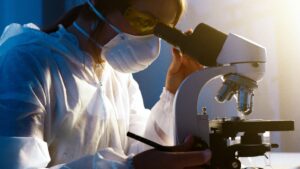(i) Grasping Biotechnology: A Distinct Advantage in Current Science
Biotechnology, frequently alluded to as biotech, is an area of science that consolidates science with innovation to foster imaginative answers for different ventures. This interdisciplinary methodology has reformed how we tackle difficulties in medical care, farming, ecological manageability, and then some.
Biotechnology in Medical Care
Biotechnology has fundamentally progressed medical care by empowering the advancement of novel therapies and treatments. Through hereditary designing and biopharmaceuticals, researchers can make customized meds custom-made for individual patients, prompting more powerful medicines with fewer secondary effects.
Moreover, biotechnology assumes an essential part in sickness conclusion and counteraction. Methods like DNA sequencing and quality altering take into account the early location of hereditary issues and the advancement of designated medications to alleviate their effect.
Biotechnology in Farming
In horticulture, biotechnology has changed cultivating rehearses and expanded food creation to fulfill the developing worldwide need. Hereditarily altered creatures (GMOs) have been designed to upgrade crop yield, further develop protection from nuisances and illnesses, and endure unfriendly natural circumstances.
Also, biotechnology has worked with the improvement of manageable horticultural practices, for example, accuracy cultivating and bio-manures, which limit ecological effects while expanding efficiency.
(ii) Biotechnology and Ecological Manageability
Biotechnology offers promising answers for addressing ecological difficulties and advancing maintainability. Bioremediation, for instance, uses microorganisms to corrupt poisons and tidy up tainted destinations, reestablishing environments and shielding general well-being.
Furthermore, biotechnology adds to the development of sustainable power sources, for example, biofuels and biogas, diminishing dependence on petroleum derivatives and alleviating environmental change.
(iii) The Effect of Biotechnology on Human Wellbeing
The uses of biotechnology in medical services have altered clinical therapy and sickness the board, prompting further developed results and improved personal satisfaction for a large number of individuals around the world.
Customized Medication
One of the main commitments of biotechnology to human well-being is the improvement of customized medication. By examining a person’s hereditary cosmetics, medical services suppliers can fit therapy plans to their particular requirements, augmenting adequacy and limiting unfavorable responses.
(iv) Sickness Avoidance and Early Recognition
Biotechnology assumes a significant part in sickness counteraction and early recognition through cutting-edge demonstrative devices and screening procedures. Hereditary testing takes into consideration the distinguishing proof of hereditary inclinations to specific illnesses, empowering proactive measures to decrease risk factors and further develop generally speaking well-being results.
Advancement Treatments
The field of biopharmaceuticals has yielded notable treatments for a great many ailments, including malignant growth, immune system issues, and uncommon hereditary sicknesses. From monoclonal antibodies to quality treatment, these imaginative medicines offer new expectations for patients confronting beforehand untreatable circumstances.

(v) Headways in Agrarian Biotechnology
Biotechnology has upset horticulture by upgrading crop efficiency, working on dietary substances, and advancing ecological maintainability.
Upgraded Harvest Yield
Hereditarily changed crops designed for expanded yield play had a critical impact in tending to worldwide food security challenges. By consolidating characteristics, for example, bother obstruction and dry spell resistance, biotech yields can flourish in unfavorable circumstances, guaranteeing a steady food supply for developing populations.
Nourishing Improvement
Biotechnology has empowered the improvement of harvests with upgraded dietary profiles, tending to a lack in fundamental nutrients and minerals in weak populations. Biofortified crops, for example, brilliant rice invigorated with vitamin A, offer a feasible answer for hunger and its related well-being results.
Reasonable Cultivating Practices
Biotechnology advances reasonable cultivating rehearses by diminishing the requirement for synthetic sources of info, limiting ecological effects, and monitoring normal assets. Methods, for example, accuracy agribusiness and organic nuisance control assist with enhancing asset use while saving soil wellbeing and biodiversity.
(vi) Biotechnology: An Impetus for Ecological Preservation
Biotechnology holds colossal potential to address squeezing natural difficulties and advance preservation endeavors on a worldwide scale.
Bioremediation
Bioremediation uses microorganisms to corrupt poisons and foreign substances in soil, water, and air, offering a harmless to ecosystem answer for remediating dirtied locales and reestablishing biological systems. From oil slicks to modern waste, biotechnology-based approaches can relieve the ecological effect of human exercises.
(vii) Sustainable Power Sources
Biotechnology adds to the development of sustainable power sources, lessening dependence on petroleum products and alleviating environmental change. Biofuels obtained from plant biomass and microbial maturation offer a maintainable option in contrast to customary non-renewable energy sources, assisting with diminishing ozone-harming substance outflows and combatting an Earth-wide temperature boost.
Protection Science
Biotechnology assumes a fundamental part in protection science by safeguarding imperiled species, reestablishing environments, and fighting unlawful untamed life exchange. Strategies, for example, hereditary preservation and helped conceptive advances add to species recuperation endeavors and biodiversity protection drives around the world.
(viii) End
Biotechnology has reformed human prosperity by tending to basic difficulties in medical services, farming, and ecological manageability. From customized medication to feasible horticulture and preservation science, biotechnology offers inventive answers for work on personal satisfaction and shielding the planet for people in the future. Embracing the noteworthy capability of biotechnology is fundamental to tending to the intricate difficulties confronting humankind and building a better, more economical world.
FAQs
What is biotechnology?
Biotechnology is an area of science that consolidates science with innovation to foster creative answers for different businesses, including medical services, farming, and natural manageability.
How has biotechnology impacted healthcare?
Biotechnology has altogether progressed medical care by empowering the advancement of customized drugs, further developing illness conclusions and counteractions, and working with the production of leading-edge treatments for different ailments.
What role does biotechnology play in agriculture?
Biotechnology has upset agribusiness by upgrading crop yield, working on wholesome substances, and advancing supportable cultivating rehearses through methods like hereditary adjustment and accuracy horticulture.
How does biotechnology contribute to environmental sustainability?
Biotechnology offers answers for natural difficulties through bioremediation, environmentally friendly power creation, and preservation science, assisting with tidying up contamination, lessening ozone-harming substance emanations, and saving biodiversity.




